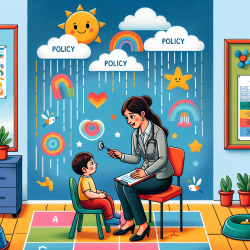Introduction
As a speech-language pathologist (SLP) dedicated to improving children's outcomes, understanding policy implications is crucial. The research article "Agenda-setting for Canadian caregivers: using media analysis of the maternity leave benefit to inform the compassionate care benefit" offers insights into policy development that can enhance our practice. By analyzing the evolution of the Maternity Leave Benefit (MLB) and its implications for the Compassionate Care Benefit (CCB), we can draw parallels to our field and advocate for better support systems for caregivers, ultimately benefiting the children we serve.
Understanding the Research
The research utilizes Kingdon’s policy agenda-setting framework to analyze the development of the MLB and its potential to inform the CCB. This framework highlights how issues gain governmental attention through three streams: problems, processes, and political processes. The study reviews national media articles and uses content analysis to explore how these streams influenced policy changes over time.
Key Findings and Recommendations
The research identifies several key recommendations for improving the CCB, based on the MLB's trajectory:
- Lengthening Leave: Just as the MLB evolved to offer longer leave periods, the CCB could benefit from extending its coverage to better support caregivers during end-of-life care.
- Flexibility in Leave Timing: Allowing caregivers to use leave flexibly, including post-death for bereavement, could enhance the support system.
- Multiple Caregivers: Like the MLB's inclusion of both parents, the CCB should allow multiple caregivers to share leave benefits.
- Reduced Qualifying Hours: Easing eligibility criteria for repeat caregivers could provide more comprehensive support.
Implications for Speech-Language Pathologists
As SLPs, we can draw parallels between these policy recommendations and our practice. Consider the following:
- Advocacy for Policy Change: Engage in advocacy efforts to support policies that benefit caregivers, understanding that improved caregiver support can lead to better outcomes for children.
- Flexible Service Delivery: Embrace flexible service delivery models that accommodate the needs of caregivers, similar to the recommended flexibility in leave timing.
- Collaborative Care Models: Encourage collaborative care models that involve multiple caregivers, akin to the shared leave benefits proposed for the CCB.
Encouraging Further Research
The study underscores the importance of ongoing research to inform policy changes. As practitioners, we should stay informed about policy developments and contribute to research efforts that highlight the needs of caregivers and children. By doing so, we can ensure that our practice remains data-driven and aligned with the best interests of those we serve.
To read the original research paper, please follow this link: Agenda-setting for Canadian caregivers: using media analysis of the maternity leave benefit to inform the compassionate care benefit.










